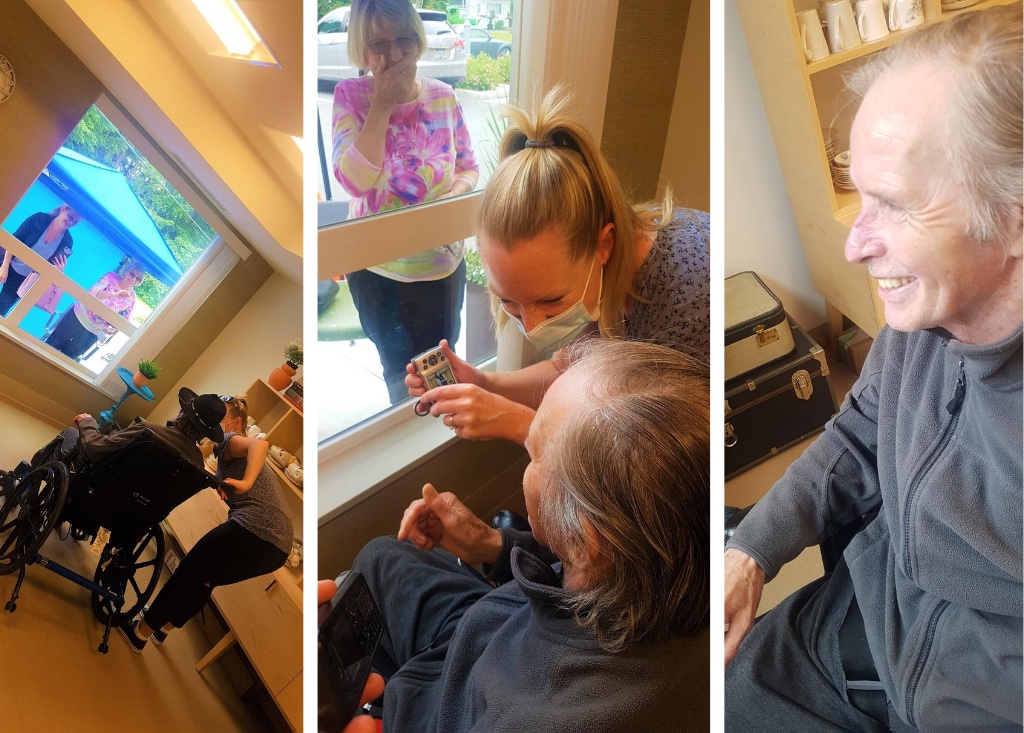The COVID-19 crisis has made us find new and better ways to keep resident-family connections strong.
Along with seniors living in care, families have been hard hit by the COVID-19 pandemic. The restrictions on visitation in long-term care and assisted living residences have taken a major physical and emotional toll on the health and well-being of seniors and their caregivers. Throughout the pandemic, many advocates have argued that the visitation restrictions have been much too strict, and even risk violating the rights of seniors living in care.[1] These restrictions on seeing loved ones in their final years, the resulting isolation and loneliness, along with the high COVID-19 infection rates and fatalities, have many seniors and family caregivers rethinking continuing care. [2]
The Office of the Seniors Advocate British Columbia (OSA) has received more calls, letters, and emails about COVID-19 related visit restrictions to long term care and assisted living homes than any other issue. Many of the stories detail the negative impact of limited visits or no visits, with some residents and their family members expressing more fear about loneliness than contracting COVID-19. [3] In response, the Seniors Advocate Isobel Mackenzie launched a five-week survey at the end of August 2020. Over 15,000 people participated, producing over 13,000 valid responses from residents, resident’s family members and friends, and the public. The report Staying Apart to Stay Safe highlights the need for residents and family members to have a collective voice in the decision-making process and makes three recommendations:
- Allow all residents to designate an essential care partner;
- Allow social visitors and determine the number allowed by balancing the risk of COVID-19 with
the risk to a resident’s health from the long-term family separations; and - Create a provincial association of long-term care and assisted living resident and family councils.
Family caregivers provide much of the care for seniors whether living at home or in congregate care settings. A study from 2020 also highlighted that seniors make up about a quarter of all caregivers. [4] As well, a recent report from the University of Alberta shows that since COVID-19, family members of those in long-term residential care are feeling cut off and unable to provide the care they normally would resulting in rising feelings of anxiety, stress and isolation. Barb MacLean, Executive Director of Family Caregivers of British Columbia notes that similar trends are being seen here in BC. Since the spring of last year, her organization’s call centre has seen a 180-per-cent rise in calls for support.
Dr. Maria Chung, Clinical Assistant Professor, Geriatric Medicine, Vancouver Coastal Health Research Institute, says the prolonged isolation is having a damaging effect on seniors’ wellbeing. “A lot of them are very, very dependent,” she explained. “If someone has a lot of difficulty eating because of physical disabilities or because of their cognitive issues, they might take an hour to eat and the staff would not have time to do that. But if you have a family member such as an adult child or a spouse come, they’re the ones that would be sitting with them and helping them eat.”
Elim Village has long viewed residents’ families as their partners in care, and to have families missing from the daily lives of their residents because of COVID-19 has had a huge impact on residents’ quality of life. In particular, last year they started planning their visitation centre working with families, residents, and staff. Once the centre was open there was a noticeable difference in the moods of the residents and staff.
BC Care Providers Association (BCCPA) has also advocated for policies that carry the appropriate balance between ensuring the safety of residents and staff and supporting quality of life through family connections. In its November 2020 report Review of The Response To COVID-19 In Seniors Care and Living, BCCPA recommended the importance of establishing robust protocols for safe and frequent social contact between residents and family members. As well, last year BCCPA and EngAge BC released a helpful guide to enhancing in-person and online visits that support the best quality of life possible for residents of long-term care and assisted living homes.
On February 11th, the speaker series Care to Chat will look at how COVID-19 visitation restrictions have impacted seniors and their families, the important role that family caregivers play across the seniors living and care continuum, and how a better balance can be sought that will put seniors and families first.
- Terry Lake, CEO, BC Care Providers Association (moderator)
- Isobel Mackenzie, BC Seniors Advocate
- Barb McLean, Executive Director, Family Caregivers of BC
- Dr. Maria Chung, Clinical Assistant Professor, Geriatric Medicine, Vancouver Coastal Health Research Institute
- Ron Pike, Executive Director, Elim Village
When: Thursday, February 11th, 2021: 10 a.m. – noon
Where: Via Zoom
Tickets: $50 members, $75 non-members
Registration will be capped to allow for a fulsome discussion. Attendees will participate in small group discussions.
SOLD OUT!
[1] CTV News. Families consider legal action, say rights of seniors in care being violated by pandemic visitor restrictions. December 17, 2020. Accessed at: https://bc.ctvnews.ca/families-consider-legal-action-say-rights-of-seniors-in-care-being-violated-by-pandemic-visitor-restrictions-1.5236760
[2] CBC News. Pandemic has seniors and caregivers rethinking continuing care. December 18, 2020. Accessed at: https://www.cbc.ca/news/canada/calgary/pandemic-has-seniors-and-caregivers-rethinking-continuing-care-covid-cases-1.5846737
[3] https://www.seniorsadvocatebc.ca/app/uploads/sites/4/2020/11/StayingApartToStaySafe-NR.pdf
[4] Statistics Canada. The experiences and needs of older caregivers in Canada. November 24, 2020. Accessed at: https://www150.statcan.gc.ca/n1/pub/75-006-x/2020001/article/00007-eng.htm





